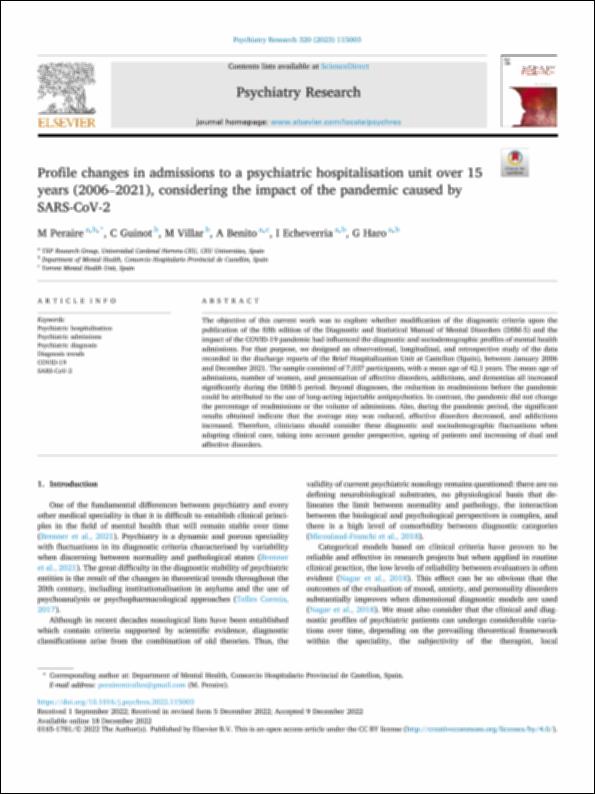Por favor, use este identificador para citar o enlazar este ítem:
http://hdl.handle.net/10637/14228Profile changes in admissions to a psychiatric hospitalisation unit over 15 years (2006-2021), considering the impact of the pandemic caused by SARS-CoV-2
| Título : | Profile changes in admissions to a psychiatric hospitalisation unit over 15 years (2006-2021), considering the impact of the pandemic caused by SARS-CoV-2 |
| Autor : | Peraire Miralles, Marc Guinot Fauvell, Cristina Villar García, Mariano Benito Delegido, Ana Echeverría Gómez, Iván Haro Cortés, Gonzalo Rafael |
| Materias: | Enfermedades mentales - Diagnóstico.; Mental illness - Diagnosis.; Enfermos mentales - Cuidados hospitalarios.; COVID-19 Pandemic, 2020-; Psychiatric hospital care.; Pandemia de la Covid-19, 2020- |
| Editorial : | Elsevier |
| Citación : | Peraire, M., Guinot, C., Villar, M., Benito, A., Echeverria, I. & Haro, G. (2023). Profile changes in admissions to a psychiatric hospitalisation unit over 15 years (2006-2021), considering the impact of the pandemic caused by SARS-CoV-2. Psychiatry Research, vol. 320, art. 115003 (feb.). DOI: https://doi.org/10.1016/j.psychres.2022.115003 |
| Resumen : | The objective of this current work was to explore whether modification of the diagnostic criteria upon the publication of the fifth edition of the Diagnostic and Statistical Manual of Mental Disorders (DSM-5) and the impact of the COVID-19 pandemic had influenced the diagnostic and sociodemographic profiles of mental health admissions. For that purpose, we designed an observational, longitudinal, and retrospective study of the data recorded in the discharge reports of the Brief Hospitalization Unit at Castellon (Spain), between January 2006 and December 2021. The sample consisted of 7,037 participants, with a mean age of 42.1 years. The mean age of admissions, number of women, and presentation of affective disorders, addictions, and dementias all increased significantly during the DSM-5 period. Beyond diagnoses, the reduction in readmissions before the pandemic could be attributed to the use of long-acting injectable antipsychotics. In contrast, the pandemic did not change the percentage of readmissions or the volume of admissions. Also, during the pandemic period, the significant results obtained indicate that the average stay was reduced, affective disorders decreased, and addictions increased. Therefore, clinicians should consider these diagnostic and sociodemographic fluctuations when adapting clinical care, taking into account gender perspective, ageing of patients and increasing of dual and affective disorders. |
| Descripción : | Este artículo se encuentra disponible en la siguiente URL: https://www.sciencedirect.com/science/article/pii/S0165178122005947 |
| URI : | http://hdl.handle.net/10637/14228 |
| Derechos: | http://creativecommons.org/licenses/by/4.0/deed.es |
| ISSN : | 0165-1781 |
| Idioma: | es |
| Fecha de publicación : | 6-feb-2023 |
| Centro : | Universidad Cardenal Herrera-CEU |
| Aparece en las colecciones: | Dpto. Medicina y Cirugía |
Los ítems de DSpace están protegidos por copyright, con todos los derechos reservados, a menos que se indique lo contrario.


